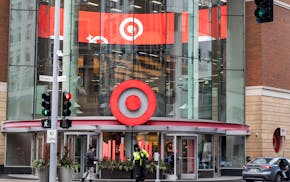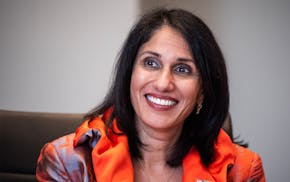Near the end of a serious and emotional day, Houston White Jr. took a quick measure of the audience he was about to address in his north Minneapolis coffee shop.
Some speakers before him ran a little long — the schedule was an hour behind — so White asked the 30 or so attendees how they were holding up.
"It's not going to take too long," he said, pulling out several pages of notes with a smile. "But you know, it's like church."
It was Sunday, the fifth anniversary of the police slaying of George Floyd. White, a real estate developer, fashion designer and culture maker, wanted the day to be about more than pain and sorrow.
There's an aphorism that people tend to overestimate what can happen in a short time and underestimate what can happen in a longer one.
I think it applies here. Not much may have changed in the city's Black community since Floyd's murder. By 2030, though, everything may have.
And one reason is White, along with some of the people who gathered with him Sunday. Best known for his eponymous fashion collections at Target, White is an influential force remaking the city's northmost edge.
Nearly 20 years ago, he moved to north Minneapolis' Camden neighborhood after living for years in wealthy suburbs. White now lives in nearby Robbinsdale, but he continues to work and invest in what he calls Camdentown.
"I don't knock anybody moving anywhere that they so choose," White told the audience. "But my story was, we felt like we had everything in the world, when we had nothing at all because we didn't have community."
That morning, White hosted a community event in Floyd's memory. There was fried fish and hush puppies and music outside his place, the Get Down Coffee Shop, on N. 44th Avenue. People painted a mural and bought secondhand and vintage clothes.
White, however, didn't want the day to go by without looking forward. He invited some neighbors and some people he'd heard were thinking about moving to the neighborhood to meet.
"What are we going to grow?" White asked them.
He recalled the five nights after Floyd's death, when people roamed Minneapolis and St. Paul burning down businesses. He stood with four friends outside the coffee shop, all of them packing guns, on the first night.
After two tense encounters with strangers very late, White decided he wouldn't ask his friends to defend the shop again. No one touched it that terrible week.
"I went home and reflected how do I turn this pain into purpose," White said.
Floyd's murder is not the only moment of pain that influences White. His wife died of cancer in 2018 at age 37. "Her legacy lives on through all of what we do here," he said.
He also paid tribute to his sister, who died last year at age 51 after spending the last years of her life working with him.
"What we have built is a place where, if George had walked in five years ago, we would have put our arms around him, walked him back to the door with his counterfeit $20 and handed him another $5 and told him to go across the street and get something to eat," White said, motioning to the nearby North Market.
White asked the audience, how does he know? "Well, we have a regular customer. ... Tall, lanky, white dude. He has some struggles with community," White said, using a euphemism for the man's racist slurs. "We try to de-escalate."
The racial reckoning that followed Floyd's murder, which President Donald Trump and some of his supporters think was unfair to white people, appears over. That's a problem, even if the reckoning for some people was merely a signs-on-lawns performance.
The bigger problem would be if the economic progress of Black Americans and other people stalls. The national economy can't afford that. Places like Minnesota, where all marginal economic growth is due to people of color, would suffer even worse if that happened.
White made no mention of politics. Instead, he discussed both how risky it is for wealthy people to invest in a poor neighborhood and how gentrification can hurt the people already there.
"What we're trying to figure out is, how do you stave off displacement but also build for aspirations?" White said. "Nobody wants to live in affordable housing. We try to create this product called aspirational affordable housing done differently."
Before White spoke, a panel of neighbors discussed why they moved to Camden. Shirley Lakpa, an Apple Valley native who recently moved to the Twin Cities from Washington, D.C., and is looking to buy or build a home, asked them whether their "joy and excitement" would die down.
Ron Richard, a banker and financial advisor to White, told her no can know the future but he and White plan to spend more on Camdentown. A pizza place and more housing are on the horizon.
"They're not looking for an exit opportunity," Lakpa, who works in finance, told me later. "I'm invigorated. I want to come here. I'm going to tell my friends about it."
Near the end of his speech, White tapped his phone to play "Murder to Excellence," the 2011 song by Jay-Z and Kanye West juxtaposing the extremes of Black America.
"Since that horrible day five years ago, there has been a lot of talk, a lot of promises, a lot of plans about making plans, a lot of fear frankly," White said. "But I ask, what have you done and how are you fulfilling your purpose and, by doing so, making a better world for everybody?"
He said he would invite them back next year to find out.
"I grew up in small churches. I'm not a mega-church dude. What's going on with a few people is the best thing in the world to me," White said.

Ramstad: Minnesota's big businesses are in crisis with a common problem

Ramstad: No business can 'eat' all the tariffs, not even Walmart

Ramstad: Donaldson is protected from tariff chaos after expanding globally the right way


